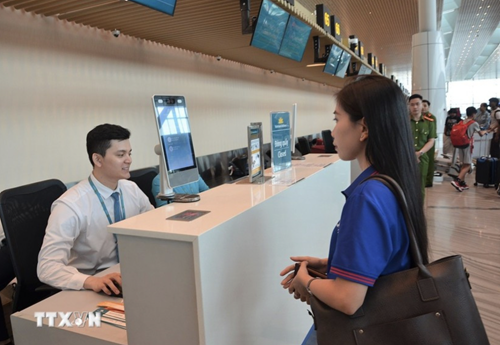The online check-in function on the VNeID application allows citizens to complete these procedures quickly and conveniently. At the same time, it helps reduce congestion at check-in counters, improve travel experience, and promote digital transformation in the aviation sector. To use this feature, individuals must have a Level-2 digital identification account.
    |
 |
|
Passengers undergo facial recognition during the check-in process. |
Accordingly, the implementation process is divided into three phases. Phase 1, from June 9 to July 15, focuses on summarizing and evaluating the pilot results and officially putting the solutions into service at at Noi Bai International Airport, Terminal 3 of Tan Son Nhat International Airport, as well as Da Nang, Phu Quoc, Cam Ranh, Phu Bai, and Cat Bi international airports.
During Phase 2, from July 16 to September 15, the initiative has been rolled out at Can Tho International Airport and 10 domestic airports: Dien Bien, Buon Ma Thuot, Rach Gia, Con Dao, Phu Cat, Pleiku, Tuy Hoa, Chu Lai, Dong Hoi, and Tho Xuan.
Meanwhile, Phase 3, from September 16, 2025, to January 1, 2026, will continue expanding the scope of implementation and finalizing the legal framework, aiming to ensure that at least 70% of domestic air passengers pass through automated gates (including both security checkpoints and boarding gates) using solutions based on digital identification, electronic authentication, and biometric recognition.
    |
 |
|
A police officer guides a passenger process online check-in via VNeID application. |
In the coming period, the C06 Department will continue to closely coordinate with local authorities and relevant agencies to expand the implementation scope and raise the number of air passengers using digital ID accounts via the VNeID app.
In addition, solutions related to technical infrastructure, staff training, and public communication will be strengthened to ensure effective and comprehensive implementation. These efforts aim toward building a digital government, digital citizens, and a digital society in line with the national development orientation to 2030.
Source: VNA